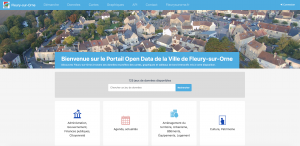At the center of all attention, data has become the cornerstone of a territorialized crisis management. What are the prospects for the future of data and the Cloud after the pandemic? Some answers with Jean-Marc Lazard, CEO of Opendatasoft, a company helping public and private players alike to leverage data… the very data we have learned to live with.
In the face of the crisis, could data be seen as an indicator and a vector of solutions?
“The crisis has highlighted that, without sharing data (in a restricted circle at the very least), it is impossible to work together effectively.” This is one of the first observations of Jean-Marc Lazard, for whom decision makers “became aware that shared information was key to apprehending and seeking collective solutions to the health emergency.” If information existed, it was fragmented or difficult to access. The need for a transversal understanding was quickly felt in order to measure, as closely as possible, the potential impacts of the crisis. “The reality principle takes precedence. It is one thing to talk to each other over a video conference, but when you have to work collectively on a subject, words are not enough. Only data can influence decisions and behaviors.” There are many examples: telecom data informs about population movements, social security statistics total business creations or closures, energy operators like Veolia detect the presence of the virus in wastewater… The company’s CEO sums up: “The whole issue is to have tangible elements that go beyond the stage of ‘everyone has their own opinion on everything‘”.
Once the diagnosis has been made, data then becomes a determining factor in acting, establishing relationships and providing the right solution to the problem that arises. “In an emergency, agility is essential. You have to be as open as possible to all types of expertise to find quick and frugal solutions. Digital technology has the ability to mobilize a lot of resources in record time and disseminate to as many people as possible.“
This approach can be seen at all scales, from the top of the state in the implementation of vaccine booking platforms, to municipalities that have had to become more inventive to deal with the daily challenges imposed by the crisis. Opendatasoft’s CEO mentions the example of the city of Dunkirk (French only), which, thanks to the proposed solution, set up a website in one day to connect fruit and vegetable producers with buyers. “During the first lockdown, how and where could one get supplies when some businesses are closed down? This is a very concrete application of data,” he comments. And the territorial issues have multiplied.
“A city is not SimCity! It is a living organism.”
Jean-Marc Lazard, CEO of Opendatasoft
Indeed, the health crisis has highlighted strong disparities between territories, but also in the way to consider their interactions. The concept of “smart territories” has emerged, in opposition to a certain programmatic and “infrastructure” centered conception of the “smart city“.
Without treating the city separately from less urbanized areas, the smart territory considers the territory as a whole, at all scales. Perhaps it is composed of heterogeneous areas, but which undoubtedly share common issues, such as the traffic between home and work. “A city is not SimCity! It is a living organism. The infrastructure approach is certainly important, but the real challenge for public players lies elsewhere: in their ability to make the daily lives of their citizens more pleasant and efficient.” In this respect, the interconnection of territories, and therefore data sharing, is a crucial subject, because “the needs of citizens are not confined to the city itself: they need to go to work, to eat, to be entertained… It is not just a matter of routers and servers in a specific place.“
The following example of the overseas territories is particularly striking, as their constrained autonomy pushes public actors to work intelligently, with a holistic and frugal approach to their resources. Clouds on the horizon? This means a reduction of energy in the electrical network. Thus, prioritizing powering hospitals or schools for example, at the expense of electric car charging stations. “It is a simple approach, with no disproportionate infrastructure or complex algorithm platform, but it requires three players (meteorological services, energy providers and mobility operators) to share data even though they come from a different world,” summarizes Jean-Marc Lazard.
Another example of clever synergy around the use of data, in the configuration of a town of 4700 inhabitants like Fleury-Sur-Orne (French only): the data platform complements the town hall’s website, offering patrimonial and touristic archives, town council deliberations, the waste collection schedule and much more. “Obviously, in Fleury-sur-Orne, the problem is not the parking of electric kick scooters… But living in a less densely populated area should not be synonymous with a lower quality of services and information. The attractiveness of territories depends on it.“
The Cloud, a prerequisite for data accessibility and availability
Cloud storage services are no stranger to the exceptional growth of data processing and collection, whose architecture has evolved considerably; it is now presented in the form of a puzzle: mass storage, big data processing, and spaces for sharing and publishing for the greatest number.
According to Jean-Marc Lazard, this approach constitutes an essential paradigm shift: “For the past five years, secure and efficient technologies available on the Cloud on demand have made the circulation of data and the associated knowledge extremely simple and fluid.” This simplicity of access to information corroborates a vision, one that Jean-Marc Lazard has placed at the heart of Opendatasoft: “Our belief is that any newly created data hub is a node, a mesh, which can only be based on Cloud infrastructure. It is a vision in opposition to the centralization: distributing resources through standardized means where everyone has the responsibility or ownership to share their data.“
In addition to the broad principles of this philosophy, the issues of availability and immediate access to data make the use of the Cloud unavoidable. “In partnerships between collectivities and administrations, data is a piece of their public service. It must be available and accessible at all times.” Hence the question of data protection and sovereignty.
This topic, which has erupted in the public debate from the perspective of personal data protection, is also of strategic importance to organizations. “Part of what’s at stake is the sovereignty of the data, but more importantly, the knowledge it carries.” In light of this COVID crisis, we have indeed seen that information is of the essence: who owns the data, who is it shared to, how and for what purpose? More than ever, not only the data sovereignty but also its circulation and sharing, will be a key issue in the understanding and common perception of our future challenges, as well as a valuable ally in how to address them.


